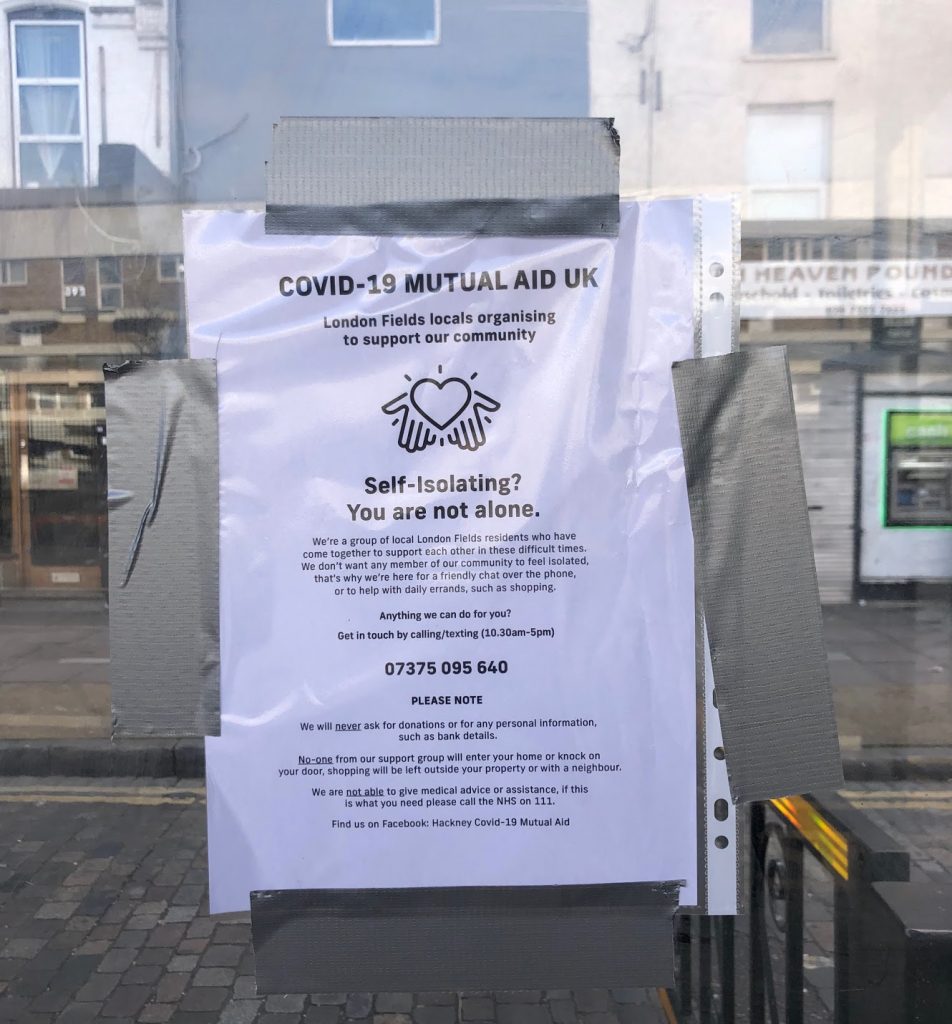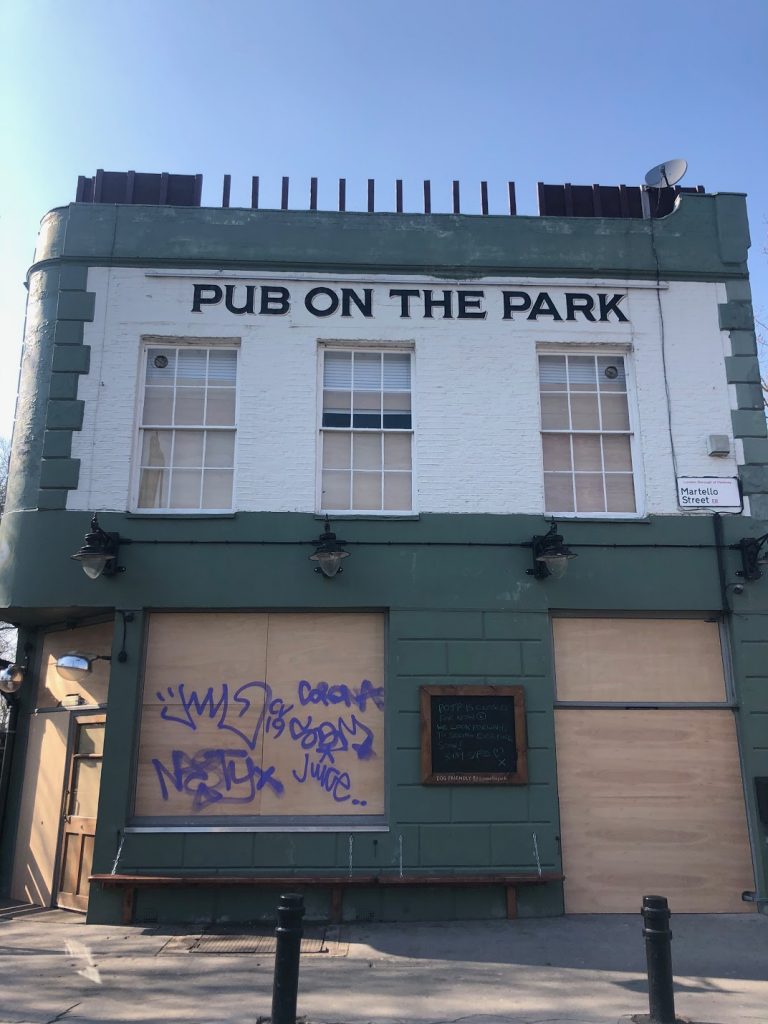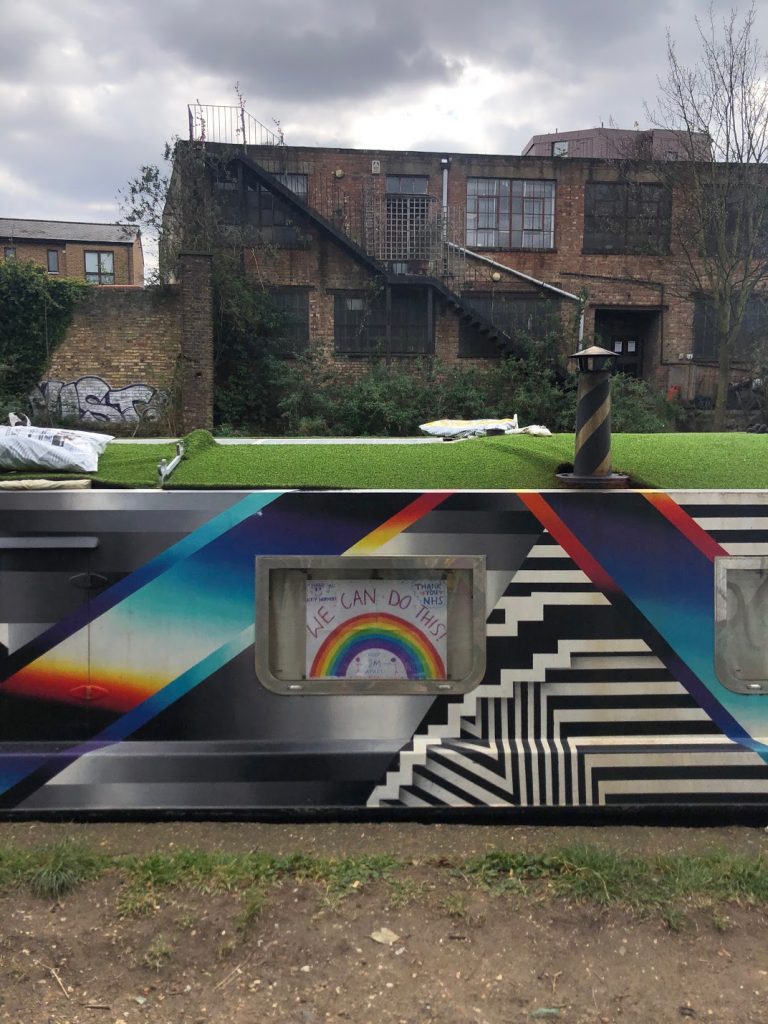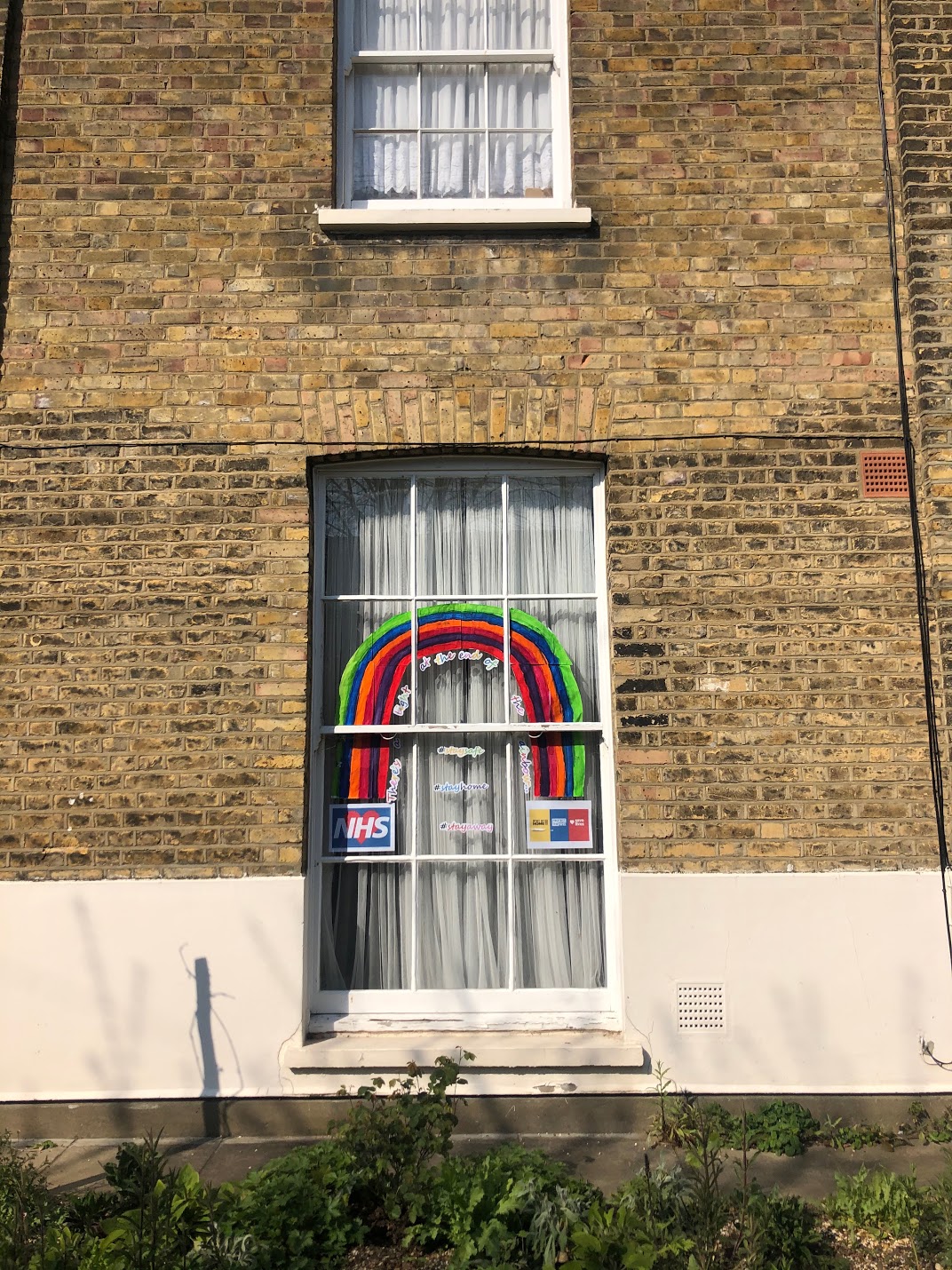The UK is now six weeks into lockdown. With key workers on the frontlines, most Londoners have been told to fight Covid-19 by staying home.
But many haven’t closed the doors on their community. Neighbors across East London are connecting digitally—some of whom had never met before the pandemic hit. They’re coordinating grocery runs and medicine drop-offs; they’re creating platforms for queer solidarity. Their stories offer a silver lining in a heavy news stream, as the novel coronavirus continues to entrench existing disparities.
Joe* is a Dalston resident involved in his ward’s Mutual Aid network. (Due to the non-hierarchical ethos of mutual aid, he wishes to remain anonymous).
The Dalston group matches requests for food or supplies with volunteers able to safely make deliveries. During the lockdown’s early days, Joe “stumbled into” its WhatsApp channel through a Facebook link. That night, he hopped on their first Zoom call.

“The big takeaway was that we wanted to create an avenue of aid for people who may not seek traditional forms of help, or alternatively, were slipping through the cracks,” Joe said. “We wanted to make sure we had a landline, and we wanted to do flyer-ing, because we knew that more vulnerable people would not necessarily be on Facebook or WhatsApp.”
From there, Dalston Mutual Aid got organized. Another local, Melissa*, helped streamline their digital channels and divide volunteers into neighborhood chats. Melissa also runs a non-profit, and put her experience into action.
“You need to safeguard not just the vulnerable but your volunteers,” Melissa said.
She identified a challenge for Dalston Mutual Aid: to balance a communal network with a coordinated structure. Joe also recognized the ambiguity of cooperative philosophy in practice, when tasks like deliveries ultimately need to be managed. He said that the Dalston group has worked to define their own version.
“I remember having a conversation with one of the others on what was pretty much the second day,” Joe said. “She mentioned that this was going to be more like a marathon than a sprint. That’s kind of what I said to myself from the beginning: if I was going to commit to doing something here, I had to be prepared to commit for a while.”
A month later, Joe has made multiple deliveries and heard touching stories of others’ work. One family in Lower Clapton leaves a crate outside their house for donations every Sunday. On Mondays, they drop it at the local food bank in bulk, so fewer people have to travel to help out.
Clapton resident Yasmin Lajoie posted a borough-wide Facebook offering to anyone experiencing domestic violence. She could check-in under the guise of mutual aid, and if necessary also had a spare room. Six individuals contacted her for assistance, while nearly 30 others reached out in support. Some were mental health specialists, parole officers, and social workers who volunteered their professional guidance.
“I think that’s why mutual aid is so lovely—because it’s just neighbors helping neighbors,” Lajoie said. “It’s not involving the police or social services or medical health professionals who sometimes pose a threat to the most vulnerable members of our society. Whether they pose a [real] threat, or they just pose a threat in the vulnerable person’s mind, it doesn’t really matter because it feels very real to them.”
Lajoie met with one neighbor, and was able to counsel the others through their situations online. No one in immediate danger reached out, but some were coping with the post-traumatic stress of having been abused in the past.
“They just wanted to talk with someone about it and they thought I was that person,” Lajoie said. “They could say, ‘I’m really struggling in isolation, and even though my abuser is halfway around the world or in a different borough or I haven’t seen him in a few years, I want to talk to you about it, because it’s still really troubling me.’”
Lajoie works in the music industry. She also regularly mentors homeless young people who aspire toward her field. But despite her volunteer experience, she knows there are limits to what she can currently offer people in danger.
“There’s no liability insurance, there’s no training, there’s no counseling afterwards,” Lajoie said. “There’s no safeguards in place to make sure people don’t end up in a worse situation than they started in. I really don’t know where that balance is and where we draw that line and say, ‘at this moment in time, I do have to get a professional involved.’”

After all, five weeks into lockdown, institutions across London have learned that tasking people to stay at home is not simple. The Town and Country Planning Association is acutely aware of the city’s housing crisis: Projects Assistant Koen Rutten recently stressed that decent, affordable homes need to be available for all in order to keep everyone inside. Furthermore, reports of domestic violence caution that many experiencing “hell behind closed doors” may not currently have the support they need. This is particularly concerning when UK lockdown provisions explicitly state that couples not-cohabitating should either stay in their separate household units or move in together.
Hackney Wick resident Benedikt noted that queer people are very likely to experience domestic violence. Alongside Thomas Harvey (Vaughan), Frida Abildgaard, and Monstera, he has been working throughout the lockdown on the creation of digital platform Homeisqueer. The open community hopes to bring together LGBTQIA+ folks through sober creativity and connection. They are currently accepting submissions about the concept of home, as experienced by LGBTQIA+ individuals.
“Being locked in a house can be experienced in different ways,” Benedikt said. “Home can be experienced in different ways. That form of acknowledgement is really important.”
Harvey (Vaughan) said that, despite the situation surrounding the lockdown, launching Homeisqueer under these circumstances has been fitting.
“It was well timed because it represented finding home as a feeling, finding home in a safe space as a community,” Harvey (Vaughan) said. “We wanted to create a network where people can look at something and feel like they’re not alone, that they can find people to love and love them back.”
Abildgaard is a designer who has been helping with graphics and archival posts about LGBTQIA+ history. She said it has been comforting to try to make a difference through Homeisqueer “when nothing really makes sense in the world.”
“It’s like bringing the past into the present in a way,” she said. “It’s also doing something meaningful, designing something that hopefully people will react to and notice, especially now that queer rights are being neglected because we’re focusing on a crisis that’s unfolding globally.”
Monstera has been copywriting from a house currently shared with queer individuals “who are very much like-minded and like-spirited.” They said they are treasuring that energy in this time, and want to bring it to the platform.
“I would like to see Homeisqueer serve a lot of overlapping purposes with the overarching aim of finding a connection,” Monstera said. “So going and finding those queer people who don’t have that in their structural home at the moment is something we can aim to target in the next weeks or even days.”

Monstera also hopes that similar initiatives around London can prompt “a restructuring of our society’s interactions and of building a community—actually getting to know your neighbors and maintaining those relationships after the pandemic.” Harvey (Vaughan) said that Homeisqueer is founded on the idea of developing community, and that they have learned the importance of “finding people who believe in something as much as you believe in it” to do so.
With lockdown measures currently slated to last at least another two weeks, there is promise in the creative, collaborative ways that East Londoners have networked throughout a situation that had no roadmap. The task will be mobilizing the present moment’s collective energy into a post-pandemic future that is truly more cooperative.
* Names changed to protect identity

